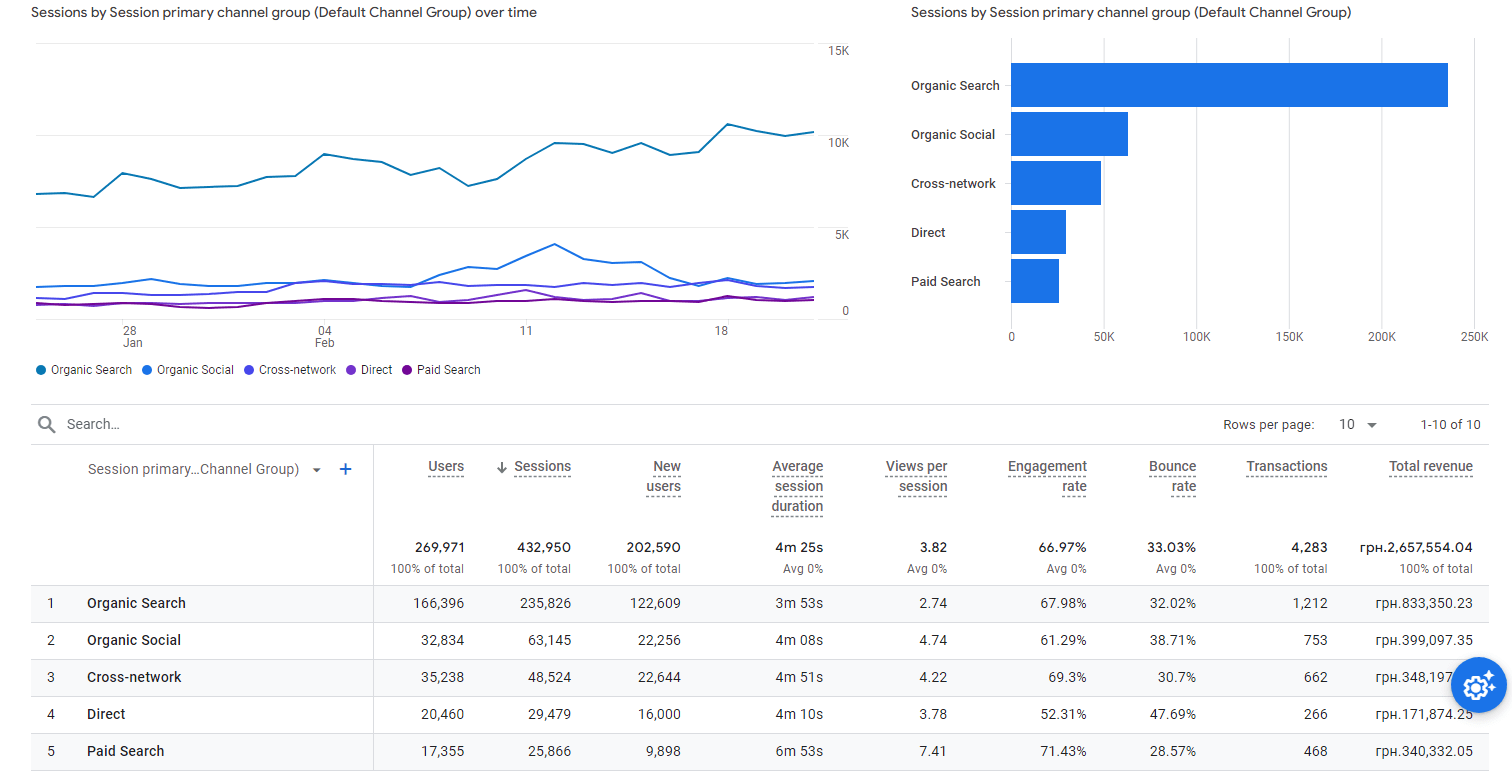Ever tried to shout in a crowded room? That’s digital marketing for entrepreneurs in today’s online world – a noisy challenge you can master. Your business’s growth and exposure in the ever-changing digital market depend on digital marketing. With the right strategies and tools, like those offered by Plerdy, entrepreneurs can navigate this complex field and turn noise into harmonious success. This guide is your compass in the digital marketing jungle, providing clear, actionable steps to elevate your business. Let’s dive in and turn the digital chaos into your entrepreneurial symphony.

Understanding the Digital Marketing Landscape
Imagine navigating a maze without a map; that’s what diving into digital marketing can feel like for entrepreneurs. However, understanding this landscape is crucial for your business’s success. Let’s decode the digital marketing world, making it simpler and more navigable for you.
Evolution of Digital Marketing For Entrepreneurs
Digital marketing has grown from banner ads to complicated plans. Initially, it was all about having an online presence, but now, it’s about being smart, targeted, and customer-centric. Social media, SEO, and content marketing have changed business-customer engagement. Forbes highlights the evolution of digital marketing, noting its shift towards more interactive and personalized strategies.
Future Trends in Digital Marketing
Staying ahead means keeping an eye on future trends. Personalization is becoming more important with AI and machine learning. Video marketing is skyrocketing, with platforms like YouTube and TikTok leading the way. Moreover, voice search optimization is rising due to the popularity of AI assistants like Alexa and Google Assistant. HubSpot’s report on 2024 marketing trends emphasizes the growing importance of these technologies in shaping the future of digital marketing.
The digital marketing landscape is constantly evolving. The journey has been rapid and transformative, from its humble beginnings to its current focus on advanced technologies like AI and video content. For entrepreneurs, staying updated with these changes is beneficial and essential for survival in the digital arena. The key to mastering this landscape is understanding where it is now and anticipating where it will be tomorrow. Your digital marketing strategy must be as dynamic and adaptable as the landscape.
The Importance of SEO in Digital Marketing For Entrepreneurs

Think of SEO as the compass that guides customers to your business in the vast ocean of the internet. Without it, your online presence might as well be a ship lost at sea. SEO is not just a buzzword; it’s a fundamental element of digital marketing that can significantly impact your business’s online visibility and success.
Basics of SEO For Entrepreneurs
SEO optimizes your website for search engines like Google. It’s a blend of using the right keywords, optimizing website speed, and ensuring your site is mobile-friendly. Moz, a leader in SEO tools and resources, emphasizes that SEO is about understanding what people are searching for online, the answers they seek, the words they use, and the type of content they wish to consume. Meeting these user needs increases your site’s relevance and authority, which boosts your rankings in search results.
Adapting to SEO Changes
SEO isn’t static; it’s a constantly changing field. Google frequently updates its algorithms, meaning what worked yesterday might not work today. Search Engine Journal, a trusted source of SEO news and tips, suggests staying adaptable and up-to-date with SEO trends. This includes understanding the shift towards voice search optimization, the growing importance of local SEO for small businesses, and the need for high-quality, engaging content.
SEO is more than just a set of techniques; it’s a strategic approach to digital marketing. It’s about creating a website that looks good and performs well in search engine rankings. Understanding and using SEO can increase organic traffic, user experience, and business growth. In digital marketing, SEO is not just important; it’s essential.
Harnessing Digital Marketing in Social Media for Entrepreneurial Success

In digital marketing, social media is not merely a platform for social interactions; it has evolved into a vibrant digital marketplace. For entrepreneurs, this represents an untapped opportunity, a treasure trove ready to be explored. Mastering digital marketing through social media can exponentially enhance an entrepreneur’s business growth, online visibility, and customer interactions.
Selecting Optimal Digital Platforms for Entrepreneurs
Some social media platforms offer different values in digital marketing, particularly for entrepreneurs. Digital entrepreneurs must pinpoint the platforms where their target market is most active. Research, like that from the Pew Research Center, indicates varying platform preferences across demographics. For example, Instagram appeals more to the younger crowd, whereas LinkedIn is the go-to for professionals. Entrepreneurs must choose digital platforms that align with their business objectives and audience preferences.
Crafting a Digital Marketing Strategy on Social Media
A haphazard approach to social media is ineffective for entrepreneurs keen on digital marketing. A robust strategy is essential. This means setting clear goals, deeply understanding your audience, crafting engaging content, and timing your posts for maximum impact. Social media management tools like Hootsuite advocate a combination of promotional, informational, and interactive material to keep your audience engaged.
Interactive Engagement with Your Audience
At its core, social media engagement is crucial in digital marketing. Entrepreneurs must actively respond to comments, participate in discussions, and encourage user-generated content to foster a community around their brand. Buffer’s insights on social media engagement emphasize the need for authenticity and prompt responses to build a dedicated customer base.
Social media is critical for business advancement in today’s digital age. For entrepreneurs, selecting the appropriate platforms, devising a strategic approach, and actively engaging with their audience can revolutionize their digital marketing efforts. It’s not just about having a social media presence; it’s about making that presence impactful. By adeptly using social media in your digital marketing strategy, you can broaden your entrepreneurial reach, fortify your brand, and cultivate enduring connections with your clientele.
The Power of Content Marketing For Entrepreneurs

Digital marketing is content-driven. It’s not just about bombarding your audience with sales pitches; it’s about providing value through information, entertainment, and engagement. Effective content marketing can elevate your brand, build trust, and drive profitable customer actions.
Types of Content Marketing For Entrepreneurs
Content marketing encompasses various formats – blogs and videos to infographics and podcasts. Each type serves a unique purpose and engages audiences differently. For instance, blogs are great for SEO and establishing thought leadership, while videos can be more engaging and shareable, as highlighted by a report from HubSpot. Diversifying your content portfolio to meet audience preferences is crucial.
Creating Engaging Content
The heart of content marketing is creating content that resonates with your audience. This means understanding their needs, interests, and pain points. Content should not only inform but also inspire and persuade. As advised by Content Marketing Institute, the content should be original, relevant, and timely, which increases its shareability and engagement. Quality trumps quantity – having fewer pieces of high-quality content than a plethora of low-quality posts is better.
Measuring Content Success
The success of content marketing is not just measured by views or likes but by the engagement and conversion it generates. Google Analytics can track page views, time spent on a page, and conversion rates. Measuring content success helps refine your strategy and improve ROI.
Content marketing is a significant digital marketing tactic. It’s about crafting and sharing valuable content to attract, engage, and convert your target audience. Content marketing is not a one-time effort; it’s a continuous process of creating, publishing, promoting, and measuring content. Know what works, create engaging material, and track its results to grow your business using content marketing.
Maximizing ROI with Paid Advertising For Entrepreneurs

Throwing money at ads and hoping for the best isn’t a strategy; it’s a gamble. Paid advertising can enhance your digital marketing ROI if done appropriately. The key is to strategize and optimize your paid campaigns for maximum impact.
Understanding PPC For Entrepreneurs
Pay-per-click (PPC) advertising is a model where you pay only when someone clicks on your ad. It’s not just about driving traffic but driving the right traffic. A WordStream study found that businesses make $2 for every $1 they spend on Google Ads. To succeed with PPC, you must know your target, choose the proper keywords, and write interesting ads.
Effective Ad Targeting
The beauty of paid advertising is its ability to target specific audiences. Effective targeting involves understanding customer demographics, interests, and online behaviors. Platforms like Facebook provide detailed targeting options, including location, age, gender, and interests. A report from Social Media Today emphasizes the importance of A/B testing different ad sets to determine which targeting options yield the best results.
To maximize ROI with paid advertising, it’s crucial to understand the mechanics of PPC and the art of targeting. This means choosing the right platforms, setting clear objectives, and constantly analyzing and adjusting your strategies. Effective paid advertising is not set-and-forget; it requires ongoing attention and optimization. Paid advertising can boost business development and profitability if done effectively.
Analytics and Data-Driven Marketing For Entrepreneurs

In a world awash with data, navigating your business without leveraging analytics is like sailing without a compass. Analytics and data-driven marketing are the beacons that guide marketers in understanding consumer behavior, optimizing campaigns, and driving better business decisions. This approach turns data into actionable insights, propelling your marketing strategies forward.
Basics of Analytics For Entrepreneurs
Analytics collects, analyzes, and interprets data to improve business performance. It’s about measuring the effectiveness of your marketing campaigns, understanding your audience, and identifying trends. Google Analytics is a fundamental tool that offers insights into website traffic, user behavior, and campaign performance. Deloitte found that data-driven marketing makes companies six times more profitable year-over-year. However, it’s not just about collecting data; it’s about interpreting it to make informed decisions.
Utilizing Data for Marketing Strategy
Utilizing data effectively means moving beyond basic metrics like clicks and impressions to deeper insights like customer lifetime value and conversion pathways. Understanding the customer journey and what resonates with your audience can lead to more tailored and focused marketing. McKinsey & Company found that data-driven firms acquire customers 23 times more often. It’s about using data to find opportunities, refine your tactics, and create more engaging and effective marketing campaigns.
Analytics and data-driven marketing are not just buzzwords but essential tools for modern marketers. By understanding and leveraging data, you can make more informed decisions, tailor your strategies to meet customer needs, and ultimately drive better business outcomes. In the digital age, data is your most valuable asset. Use it wisely to inform your marketing strategies and watch your business grow.
Embracing Emerging Technologies in Digital Marketing

In the digital marketing universe, staying static means staying caught up. The adoption of new technology is a strategic need for firms seeking growth. As we venture into the digital era, understanding and leveraging new technologies becomes essential in creating more engaging, efficient, and effective marketing strategies.
Incorporating Artificial Intelligence (AI) For Entrepreneurs
AI in digital marketing is transforming how businesses interact with customers. AI is revolutionizing the marketing landscape, from chatbots that provide instant customer service to AI-driven analytics that offer deep insights into consumer behavior. Gartner predicts that by 2025, customer service organizations that embed AI in their customer engagement platform will elevate operational efficiency by 25%. AI allows for personalized marketing at scale, enabling businesses to create more relevant and engaging customer experiences.
Leveraging Virtual Reality (VR) and Augmented Reality (AR)
AR and VR are taking customer experience to a whole new level. These technologies offer immersive experiences, allowing customers to try products virtually or experience services in a simulated environment. According to a report by the International Data Corporation, spending on AR/VR is expected to reach $18.8 billion in 2020. Brands can use AR/VR to enhance product visualization, offer virtual try-ons, and create engaging marketing campaigns that stand out.
Utilizing Blockchain for Transparency and Security
Blockchain technology, used in cryptocurrencies, also benefits digital marketing. It can bring transparency to ad buys, preventing fraud and ensuring marketing budgets are spent effectively. Blockchain can also enhance customer trust by providing transparency in transactions.
Embracing these emerging technologies can give businesses a competitive edge in digital marketing. AI’s predictive capabilities, AR/VR’s immersive experiences, and blockchain’s security and transparency are not just futuristic concepts but practical tools that can be integrated into your digital marketing strategy today. As we move forward, staying abreast of these technologies and understanding how to apply them will be crucial for your business’s continued success and growth. Explore the possibilities, experiment with new ideas, and watch your digital marketing efforts reach new heights.
Navigating the Mobile Marketing Landscape For Entrepreneurs

In today’s fast-paced world, mobile marketing is not just an option; it’s a necessity. Mobile marketing is essential for every organization that wants to compete as most internet users use smartphones. It’s about reaching your audience where they are: on their phones.
Mobile marketing involves more than just making your website mobile-friendly. It includes mobile user engagement strategies. This includes SMS marketing, mobile apps, responsive web design, and location-based services. According to Statista, mobile accounts for half of global online traffic, emphasizing the importance of mobile optimization.
Mobile marketing changes regularly. Keeping up with trends and innovations is crucial. Whether through mobile-optimized websites, apps, or SMS marketing, the goal is to provide users with a seamless and engaging experience on their mobile devices. In the digital age, a mobile-first approach is not just beneficial; it’s essential for connecting with your audience and driving business success.
Conclusion
Digital marketing requires constant learning and adaptability. We’ve explored various facets, from SEO and content marketing to the nuances of mobile marketing. What works today may not function tomorrow in the digital world. Keep learning, keep experimenting, and always stay ahead of the curve. Curious about more cutting-edge insights in digital marketing? Dive into the wealth of articles on Plerdy’s blog, your go-to resource for staying updated and innovative. Plerdy supports your digital marketing journey with tools and insights that drive success. Stay connected, stay informed, and keep growing with Plerdy.
